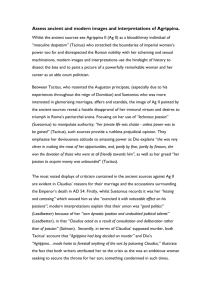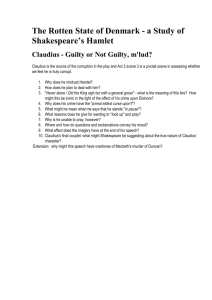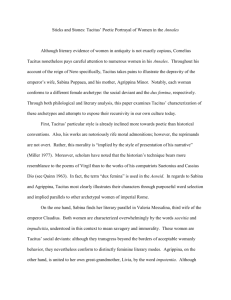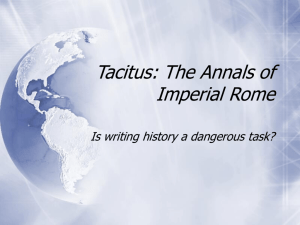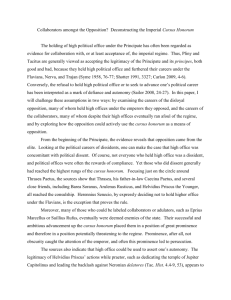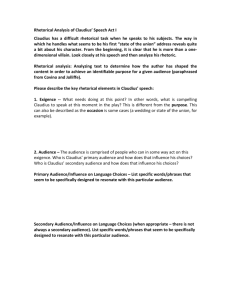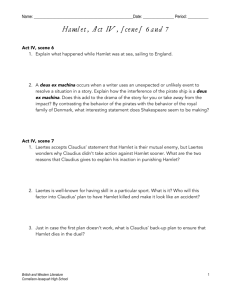rischen Möglichkeit" ist mit dem der "Realmöglichkeit" Hart-
advertisement
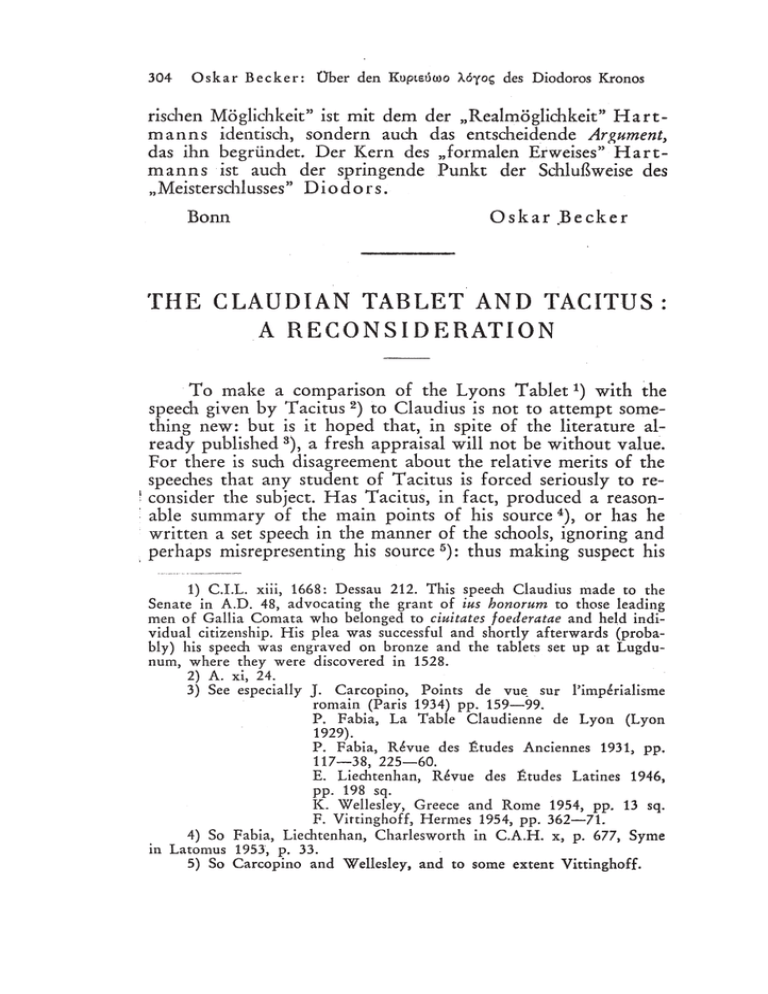
304 Oskar Becker: über den KOpLEUlllO A6yo~ des Diodoros Kronos rischen Möglichkeit" ist mit dem der "Realmöglichkeit" Hartman n s identisch, sondern auch das entscheidende Ary,ument, das ihn begründet. Der Kern des "formalen Erweises" Hartmanns ist auch der springende Punkt der Schlußweise des "Meisterschlusses" Diodors. Bonn Oskar .Becker THE CLAUDIAN TAB LET AND TACITUS A RECONSIDERATION To make a comparison of the Lyons Tablet 1) with the speech given by Tacitus 2) to Claudius is not to attempt something new: but is it hoped that, in spite of the literature already published 8), a fresh appraisal will not be without value. For there is such disagreement about the relative merits of the speeches that any student of Tacitus is forced seriously to rei consider the subject. Has Tacitus, in fact, produced a reasonable summary of the main points of his SOUl"Ce 4), or has he written a set speech in the manner of the schoo1s, ignoring and i perhaps misrepresenting his source 5): thus making suspect his 1) C.I.L. xiii, 1668: Dessau 212. This speech Claudius made to the Senate in A.D. 48, advocating the grant of ius honorum to those leading men of Gallia Comata who belonged to ciuitates foederatae and held individual citizenship. His plea was successful and shortly afterwards (probably) his speedl was engraved on bronze and the tablets set up at Lugdunum, where they were discovered in 1528. 2) A. xi, 24. 3) See especially J. Carcopino, Points de vue. sur l'imperialisme romain (Paris 1934) pp. 159-99. P. Fabia, La Table Claudienne de Lyon (Lyon 1929). P. Fabia, Revue des Etudes Anciennes 1931, pp. 117-38, 225-60. E. Liechtenhan, Revue des Etudes Latines 1946, pp. 198 sq. K. Wellesley, Greece and Rome 1954, pp. 13 sq. F. Vittinghoff, Hermes 1954, pp. 362-71. 4) So Fabia, Liechtenhan, Charlesworth in C.A.H. x, p. 677, Syme in Latomus 1953, p. 33. 5) So Carcopino and Wellesley, and to some extent Vittinghoff. N. P. MillIer: The Claudian Tablet and Tacirus : A Reconsideration 305 reliability as an historian? The latter opinion is the one most! recently 6) reiterated: it is the contention of this paper that the , former, though sometimes falsely based on excessive admiration i for Tacitus and exaggerated depreciation of Claudius, is much i nearer the truth. Before the speeches are examined, it is necessary to emphasise certain general principles 7). No ancient historian, with his high regard for unity of style, would incorporate in his work another man's exact words, except for some specific and occasional purpose, and then very briefly. (When, for example, Tacitus quotes the statement of Subrius Flavus, he deerns it necessary to explain why he has so quoted 8). If therefore the ancient historian wished to incorporate in his work a speech of importance to his period, he had to summarise it, either in Oratio Obliqua (and this, though· advocated by Trogus 9), would, ifcontinually practised, become monotonous), or in Oratio Recta 10) in, naturally, his own literary style. The form of the resulting speech was as tradition al as the use of it, and had obvious affinities with the types taught in the rhetorical schools. Considerations of style apart, the commOn use of in hunc modum to introduce such speeches shows that the historian was not claiming to give a verhatim report. What was produced was a speech in an elaborate, conventional literary form, in the individual style of the historian. It folIows, therefore, that the quality of the style of Claudius is irrelevant to any discussion of the merits of our two speeches, and that attempts to accuse Tacitus by defending the style of Claudius 11) are beside the point 12). Regardless of its 6) By K. Wellesley. 7) These are generally admitted, but their full implications are not always realised. 8) A. xv, 67. ipsa rettuli uerba quia non, ut Senecae, uulgata erant, nec minus nosci decebat militaris uiri sensus incomptos et ualidos. 9) Justin xxxviii, 3, 11. 10) The process of re-writing a genuine speech in Oratio Recta is mentioned by Tacitus in A. xv, 63: aduocatis scriptoribus pleraque tradidit, quae in uulgus edita eius I;erbis inuertere supersedeo. He is clearly referring to a process with which he is familiar. By this method the historian preserves not only the arguments but also the force of the original speech. 11) Admittedly, over-enthusiastic Tacitean scholars have sometimes rated the original speech too low: but it is verbose and gauche, and sometimes irrelevant. 12) So also, naturally, is the argument that it was the pedantry and verbosity of Claudius which forced Tacitus to re-write the speech. But 306 N. P. Mi 1 i e r merits or demerits, the fact that the speech is in another man's style means that Tacitus will re-write it in his own, arid no 'rehabilitation' of Claudius will alter that fact. We may disagree with the principle, but must recognise that the ancient historiansaccepted it. It follows, too, that a speech as long as Claudius' will be greatly reduced by any historian using it for a literary work. Readers can follow close argument more easily than listeners, and indeed it would not be difficult to summarise Claudius' arguments more succinctly. Furthermore, style is not confined to the actual words of a speech, it is an expression of ahabit of thought. Tacitus, therefore, in re-writing the speech, will necessarily do more than turn Claudian Latin into Tacitean Latin. He may find a different arrangement of the arguments more natural: and he may also (understandably, if not altogether laudably) use additional arguments which his rhetorical training suggests. If Tacitus can be shown to have wilfully or carelessly misrepresented the basic facts of the original speech, then he is to be condemned: but if the changes in language and arrangement can be attributed merely to the general stylistic change, while the main points of Claudius' arguments are preserved, that is as much as can be expected of Tacitus, or of any other ancient historian who is dealing .with such a speech. Finally, tempting as it is to indulge in source criticism when we are provided with a copy of an original document and Tacitus' version of it 13), we must tread cautiously. This particular source is a speech, the treatment oE which is subject to particular conditions: it will not necessarily tell us much about Tacitus' use of sources in general. We must see what use Tacitus makes of the basic facts of this source, all stylistic complications apart, before coming to any decision about his reliability as an historian. Within these limits, then, the speeches must be examined 14). Tacitus obviously knew some version of the original speech, for it is beyond reasonable co-incidence that two writers on the although Tacitus would rewrite any such speech, the clumsy style of Claudius would compel hirn to make more, and more violent, changes than in incorporating a speech of e. g. Seneca. 13) K. Wellesley e.g. on the grounds of the discrepancies between the two versions, finds Tacitus unreliable in his use of sources. I cannot consider that he has proved his case. 14) Line references to the Tabula are to Fabia's text: for the Tacitean speech reference is made to Koestermann's Teubner text, Leipzig 1952. The Claudian Tablet and Tacitus: A Reconsideration 307 same theme should independently use so many of the same arguments and show the same notable reticences, and even use in similar contexts similar words. Whether the version used was the official record in the Acta Senatus or a contemporary literary record, it is not possible to prove 15), but if the source was a literary one, it must itself have been a dose reproduction of the Claudian original. A detailed comparison of the speeches. is complicated by the loss of part of the Tablet, so that the . beginning of the speech, and a portion of the middle, is missing. Fabia 16) argues that from the Tacitean speech the substance of this portion can be supplied; and posits a lacuna of about 30 Iines 17) in the middle of the speech (rather Iess at the beginning, because of a heading in capitalletters). It is a possible view, for Claudius was a wordy orator. But we cannot, in fact, say with any certainty how much of the Tablet is missing, or what it contained. It seems safer, therefore, to assume that the lacuna will not automatically provide an explanation for those parts of the Tacitean speech which have no parallel in the extallt parts of the Claudian oration. The main points of agreement between the two versions are these: i) innovations are necessary and everything has been new once (Tab. 11. 2-7: Tac. § 7,11. 20-1,23-4). ii) non-Roman kings ruled at Rome (Tab. 11. 8-27: Tac. § 4, ';1. 10). iii) office was opened to the plebs (Tab. 11. 28-37: Tac. § 7, 11. 21-3). iv) Roman power was spread by war (Tab. 11. 37-40: Tac. § 3, 11. 32-3). v) Roman citizenship was gradually extended (Tab. 11. 40-4: Tac. § 3, 11. 33, 1-2: § 2, 11. 28-32). vi) Rome has no need to regret the provincial senators she already has admitted (Tab. 11. 63-9: Tac. § 3,11. 3-5). vii) the Romans fought against the Gauls, but there has been unbroken peace for the last hundred years (Tab. 11. 72-5: Tac. § 5,1. 12-§6, 1. 18). 15) See Vittinghoff p. 363. One cannot here discuss the use which Tacitus made of the Acta in writing his historical works. But his single specific reference to them (A. xv, 74) shows at least that he had access to them and could therefore have found the speech there. 16) Tab. Claud. pp. 82 sq. 17) ibid. p. 145. 308 N. P. Miner There is thus substantial agreement in the arguments used: but considerable discrepancy in the methods of developing and presenting them. It is hoped to show that these discrepancies are, on the whole, permissible variations, arising from difference of style. i) The point about innovations Tacitus removes from the beginning of the Claudian speed1, and puts at the end of his own: and illustrates it with references to the opening of magistracies to plebeians, Latins and Italians, in place of Claudius' sketch of Roman history from the kings to the military tribunes. He thereby produces a much more forceful ending for his speech than exists for the original one 18). His illustrations are not invented, but taken from elsewhere in the Claudian speech 19). He has re-arranged his material, but reproduced clearly one of Claudius' major points. ii) Foreign kings ruling at Rome Claudius treats at considerable length, and with considerable antiquarian detail: Tacitus says 'aduenae in nos regnauerunt'. This antiquarian detail is not witholJt importance 20), but the real crux of the argument is that 'some even of our kings were foreigners' and that Tacitus has reproduced. iii) In dealing with the opening of office to the plebs, Tacitus has cut Claudius' lengthy references to the Republican magistrates, as he cut the detail about the early kings. But he has not misrepresented the point by so doing. Claudius is, after all, presenting a case for the admission to the Senate of certain Gauls, and therefore, although the tale of achanging constitution is in the widest general sense relevant, it is not so immediately relevant as communicatos... honores, which Tacitus emphasises by adding Latini post plebeios, ceterarum Italiae gentium post Latinos: the Gauls, obviously, come next. 18) The Lyons tablet is undamaged at the bottom and there is no sign that a third column ever existed: in which case the speech does not so much conclude as simply stOp. The form of the existing portion is so odd that it seems rash tO base on it (as Vittinghoff does p. 364) arguments for a missing conclusion. 19) commtmiratos postremo rum plebe honores. 1.36. 20) K. Wellesley p. 20 maintains that the section about Tarquinius Priscus deals with 'birth, nationality, wealth and previous office, all highly relevant to admissibility to the Senate.' But it deals with it very obscurely, and the whole section gives the impression of a single argument decorated with antiquarian detail. If Tacitus must cut his source, this is an obvious seetion to cut. The Claudian Tablet and Tacitus: A Reconsideration 309 Tacitus can often, admittedly, be preoccupied with the Senate: but here it is with the Senate that Claudius is concerned, and Tacitus is sure1y not misrepresenting his source if he drops the general illustrations of a point already adequate1y made, and concentrates on that which is immediate1y relevant. iv) Tacitus has preserved the general reference to the spread of Roman power by war, but not the rather naIve extension dealing with Claudius' own aspirations to military glory. This latter statement is interesting, but very individual, and not therefore something which another stylist would incorporate in his work. v) The extension of the citizenship and of admissibility to the Senate it is difficult to discuss, because Claudius' treatment of itc1early occupied most, if not all, of the lacuna in the middle of the speech. There is enough left to make it certain that he did discuss these topics, but of the details of his treatment of the citizenship we know nothing. Tacitus at least connects citizenship and conquest, a connection probably made by Claudius himself in the series honores. " bella . .. ciuitatem 21). And Claudius' statement that Augustus and Tiberius wished omnem florem ubique coloniarum et municipiorum . .. in hac curia esse is paralle1ed by Tacitus in Etruria Lucaniaque et omni I talia in senatum accitos and additis prouincialium ualidissimis fesso imperio subuentum est. It has been objected 22) that Tacitus' attitude to the wealth of the Gauls is sordid, and not paraHeled in the original speech. But is it reaHy sordid to expect that the Gauls, in return for the benefits of Roman civilisation (and no Roman would question the benefits) should contribute something to the Empire? And is it complete1y absent frornthe original speech? The basic argument of the Tablet is surely that the constitution has changed to meet changing needs, and that this measure too will ultimately be for the good of Rome, the Empire and the Senate. Phrases such as summae rerum nostrarum sit utile 23), ut uobis utilis senator non possit, and non magis sunt paenitendi senatores are not so very unlike in feeling the Tacitean transferendo huc quod usquam egregium fuerit and fesso imperio subuentum est. aurum et opes suas inferant potius quam separati habeant goes farther: but it is connected with benefits conferred, and Claudius him21) 11.36-40. 22) K. Wellesley p. 31. 23) The generally accepted reconstruction of 1.1. 310 N. P. Mi ller self mentions wealth as a necessary qualification for admission to the Senate 24). vi) Tacitus' treatment of the provincial senators has caused further difficulty. Part of this difficulty lies in the interpretation of Claudius' phrase insignes iuuenes... non .... magis paenitendi. Are these men present or future Senators? They are obviously Gauls, but are they existing Senators from Vienna Allobrogum 25) whom the Senate has accepted, or members of a deputation from Gallia Comata 26) whom, if admitted, the Senate will find to be worthy 27)? The real point of the comparison surely lies in Allobrogici nomen 28) and therefore the iuuenes must be Senators from the Allobroges. This interpretation is not without difficulty 29) but on any other the sentence is almost meaningless: the sense must be 'we need no more regret the presence of Allobroges in the Senate than the descent of Persicus from their great conqueror. That being so, I need only point to the Senators who already come from beyond Gallia Narbonensis, for Lugdunum 30) sends us Senators and we welcome them'. This Tacitus echoes in num paenitet Balbos ex Hispania nec minus insignes uiros e Gallia Narbonensi transiuisse? The inclusion of the Balbi seems a reasonable and relevant extension, but it has been suggested 31) that to attribute such a statement to Claudius is a gross psychological error, Balbus being the type of man most hated by the senatorial aristocracy, and so unlikely to commend this plan to them: his appearance here, it is alleged, is the result of careless use by Tacitus of the Acta, where a slighting reference to Balbus appeared in a speech opposing the motion. It does not seem to be a convincing argument. For Balbus was in fact the first foreign-born consul co hold office, and so is an excellent illustration of such innovation: it was nearly a hundred years since he died, and the 24) 1.44. 25) Fabia, Tab. Claud. p. 122. 26) K. Wellesley, p. 23, n. 1. 27) This would surely require erunt. The use of the gerundive in a purely temporal sense belongs to Late Latin. 28) As Fabia saw. 29) But illuenes can mean 'senators' (cf. A. ii, 37) and youth and vigour are here very relevant. 30) A Roman colony and therefore in a different category. But it was indubitably beyond Gallia Narbonensis and so a useful, if somewhat dishonest, example. 31) K. Wellesley, pp. 27-30. The Claudian Tablet and Tacitus: A Reconsideration 311 senatorial memory, though long, had had other and graver pre-occllpations in the intervening years: and surely Tacitlls, the senatorial champion, wOllld have noticed any accidental incongmity, or, if using it deliberately, used it to greater effect? Balbus is surely no more than a justifiable illustration of the point at issue. The reference may have been suggested to Tacitus by a speech of Cicero, containing a famous passage on the extension of the citizenship, with which these sentences have been compared 32). The speech is the Pro Balbo. vii) Claudius sets against the ten years' war between Julius Caesar and the Gauls, the subsequent hundred years of uninterrupted peace (ignoring the rising of Floms and Sacrovir in A. D. 21, a reticence which is reproduced by Tacitlls): Tacitus adds the capture of Rome by the Gauls. At worst this is an additional illustration of a genuine point - one, ::dmittedly, which makes the transition to the genuine point (from 390 to 59 B. c.) somewhat awkward, hut still intelligible. At best it may just possihly come from the original speech. For A. xi, 23 33) summarises the arguments of those opposed to the scheme of Claudius - arguments which are all (except this one) answered by the genuine speech. It wo may have been drawn from the original, from the now missing portion. So much for the similarities between the speeches. The discrepancies are equally obvious. Tacitus, apart from omitting additional illustrations of a point already made (the Republican magistrates 34), and naiveties of the Claudian style (the delight in military glory 35), and the incredihle self-apostrophe 36) and statements of little relevance (Drusus and the census 37)), makes no mention either of the precedent established by Augustus and Tiberius 38), Claudius' statement that he will leave the balance of power in Italian hands 39), or the example of Vienna and Vestinus 40). These last are more serious omissions, and we may feel that Tacitus ought to have preserved them. But, forced to compress the speech 41), he has presumably omitted those arguments whichhe considers to be of lesser' importance. How then does he come to insert things which are not in the original at all? These are: 32) 34) 36) 38) 40) cf. Fabia, Tab. Claud. p. 82. 11. 28-35. 11. 60-2. 11. 41-2. 11. 49-59. 33) See also p.313. 35) 11. 38-40. 37) 11. 75-81. 39)11. 45-8. 41) ef.p.306. 312 N. P. Mill er a) the opening sentences about the ongm of the gens Claudia and other senatorial families (§ 1, 11.23-5,27-8). b) the comparison of the policies of Athens and Sparta with that of Romulus (§ 4,11.5-10). c) the reference to freedmen's sons holding office § (4, 11. 10-12). a) Tacitus has used as illustration of the point about foreigners in Rome, famous senatorial families who came from elsewhere, and the further growth of the senatorial order by . accretion from withollt. He has, in fact, preserved the argu, ment of Claudius, but illustrated it by different examples I not accurate reporting, by modern standards, but not so dishonest as fathering on Claudius an argument he would never \Yhave used. It is, in addition, not impossible that Claudius did refer to his own family history. It is a possible topic for the missing opening of the speech, and it is one which appears in the speech of Canuleius in Livy iv, 3~5, a speech which almost certainly Claudius used in composing his ij own (2). Whether Tacitus took his illustration directly from . Livy, or indirectly through the speech of Claudius, it is fairly certain that Livy is the source. Given the gens Claudia, the other families follow naturally as additional exampies of . the same point. b) The comparison of the different methods of treating subject peoples may be considered academic 43). Even if it is a commonplace illustration of the dangers of a policy of exclusion, even if it is Tacitus' own addition, it is not contrary to the spirit of the original speech: and the passage about Romulus may weIl echo a reference in the section missing after ciuitatem. Claudius obviously dealt with the extension of the citizenship and, antiquarian as he was, may weIl have starteq with Romulus. The speech of Canuleius also makes. the point that citizenship was bestowed on former enemies 44). c) The reference to freedmen has been attacked as a product of Tacitus' dislikeof the species and as having no connection with the original speech 45). There is certainly 110 such 1 I 42) The comparison was first made by A. Zingerle, Kleine philol. ; Abhandlungen IV (Innsbruck, 1887). Compare here Livy iv, 3,14 with Tac. A. xi, 24,1. 43) K. Wellesley p. 27. For a similar reference 10 Athens and Sparta cf. Dion. HaI. H, 16-7. 44) Livy iv, 3,4. 45) K. Wellesley p. 27. The Claudian Tablet and Tacitus: A Reconsideration 313 reference in the extant portion of the Tablet. But something vel'Y like this 46) was, apparently, actua11y said in a speech by Claudius. Even if we do not claim this as a fragment of the Tablet 47), it is at least something which Claudius actua11y said and it is therefore not psychologically inapt. It is also a reasonable illustration of the point at issue. Reference has already been made 48) to A. xi, 23, the summary of the arguments against Claudius' proposaL These arguments are: i) why go beyond Italy for Senators? ii) why have Gauls? iii) what will be left for Italians? or nobles? iv) the Gauls fought against the Romans and caused Julius Caesar much trouble. v) they also sacked the Capito1. It has been objected 49) that chapter 24 is a mangled version of the original speech, to provide an artificial antithesis to chaptel' 23: that for chapter 23 Tacitus drew his material from a debate which followed the speech and was recorded in the Acta 50): and that chapter 24 is unintelligible without chapters 23 and 25 51). But if a careful comparison is made, it will be seen that the arguments in chapter 23 are answered much more specifica11y by the o'riginal speech than by A. xi, 24, viz. i) by 11. 4-5, ii) by 11. 63-72, iii) by 11. 45-8 (the nobiles are not mentioned by Claudius and may be Tacitus' own grievance: but it is equally like1y to be the grievanceof any conservative Senator), and iv) by 11. 72-5 52 ). The Tacitean Claudius answerS them much less specifica11y and therefore not to produce a rhetorical antithesis. The arguments may certainly have been cu11ed by Tacitus from the original speech (a much more likely source than a problematical debate in the Acta): but Claudius is there obviously countering opposition which he knew to exist, and as a statement of the case for the opposition, A xi, 23 remains valid. As for Hardy's objection, it may perhaps be pointed out that Tacitus is not treating the 46) Suet. Claud. 24: Appillm Caecum censorem, generis mi proallctorem, libertinorum filids in senatum adlegisse docl/it. 47) As Nipperdey-Andresen did in Annales, Berlin 1892. 48) p.311. 49) K. WeHesley p. 27. 50) F. Münzer in Festschrift Hirschfeld (Berlin 1903) pp. 38-9. 51) Hardy, Three Spanish Charters p. 146. 52) For v) see p.311. 314 N. P. Miller: The Claudian Tablet and Tacitus : A Reconsideration speech in· uawo but incorporating.it and· the proposal with which it deals in his history: chapters 23-25 init. should therefore be considered as a unit. Chapter 23 states the proposal and the arguments of the opposition, chapter 24 gives (more vividly) 53) the arguments of the Emperor in support of the proposal, and chapter 25 the result. . From this comparison of the two versions of the speech, it seems possible to draw some useful conclusions. It is the contention of this paper that, granted the literary cQnventions governing the use of speeches by the ancient historians, Tacitus has produced asound example of an 'inverted' speech and one which does not misrepresent the spirit of the original. That the words and style of the original should be lacking is, in the natureof things, inevitable: but what we have in A. xi, 24 is very far from being 'a speech of his own inI vention, inserted in his narrative' 54). Tacitus has preserved in . his version the main arguments used by the Emperor: he has • not deliberately or carelessly misrepresented Claudius' mode , of thought, nor foisted on hirn any alien arguments thathe ,himself wished to use: his omissions aremainly antiquarian detail and the additions which he makes are illustrations, not : major arguments. He has also preserved, in spite of the complete change of style, something of Claudius the man 55): in spite of the pruning, enough of the historical material 56) remains to suggest that the speaker is not any Roman Emperor, but the antiquarian pedant. It would· seem to follow, therefore, that Tacitus has not misrepresented the basic facts of his source (that source being a speech), and that he need not on this ground be termed 53) The prominence given co Claudius' speedt may indicate Tacitus' agreement with his proposaI. See Münzer loc. cit.; E. Paratore, Tacito (Milan 1951) p. 726; R. Syme in Latomus 1953, p. 33; and Vittinghoff op. cit. . 54) So Wuilleumier, Tacite (Paris 1949) p. 124. . 55) Fabia, Tab. Claud. pp. 149 and 152 argues that the ClaudlUs of . Tacitus is 'une figure ideale': while Vittinghoff p. 369 calls the speedt 'eine Kaiserrede, aber keine Rede des Claudius, farblos, lInpersönlidt:' but Liechtenhan R.E.L. 1946 pp. 208-9 maintains that the style of A. xi, 24 is sllfficiendy laboured co suggest Claudius, without spoiling the artistic standard of the work as a whole. 56) I agree with Liechtenhan that the character of Claudius is sllggested by the speech, but I think it is the antiquarian arguments used and not any artifical incoherencies of style which produce the required impression. The style is throughout the style of Tacitus, and does not pretend to be anything else. M a x M ü h I : Solon gegen Peisistratos 315 unreliable. To hirn, as to any ancient historian, these basic facts are that Claudius made a speech to the Senate, advocating the grant to the Gauls of the ius honorum, using as his main arguments the necessity for innovation, the value of fresh blood for the state, and the invalidity of the objection that the Gauls were once enemies: the rest he considers a matter of style and will use his Own. But if while re-writing the speech into the elaborate and conventional literary form, in his own style, he has preserved for us correcdy the speaker, the occasion and the main arguments, then he cannot be condemned. as an inaccurate or prejudiced historian. Finally, if these conclusions are correct, we must take the speeches in the historical works of Tacitus more seriously than before. Claudius at least made a speech, when Tacitus says he did, on the subject that Tacitus says he treated, using the arguments which Tacitus says he used. We may ask, is this an isolated example of accurate reproduction, or is it an indication of his general treatment of speeches? Royal Holloway College University of London N. P. Miller SaLON GEGEN PEISISTRATOS Ein Beitrag zur peripatetischen Geschichtschreibung Was uns Plutarch in der Solon-Vita über frühe Beziehungen zwischen Solon und Peisistratos berichtet (Verwandtschaft der beiden Sol. 1,1; Liebesverhältnis zwischen Solon und Peisistratos Sol. 1,4 f.; vgl. dazu Aristoteles ' A&. 'ltOA. 17,2) ist "vager Natur" und darf wohl nur als Fiktion und Anekdote bezeichnet werden. 1) In den folgenden Ausführungen soll der Kampf Solons gegen die Alleinherrschaft des Peisistratos an Hand der Quellen untersucht werden und zwar sollen als Grundlage die Kapitel 30 und 31 der plutarchischen Solon-Vita dienen, zu denen die Angaben in des Aristoteles 'AihlV. 'ltOAt't. c. 14 so1) Vgl. Fr. Schachermeyr bei Pauly-Wissowa, R. E. u. Peisistratos Sp.160.
